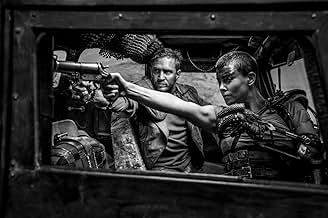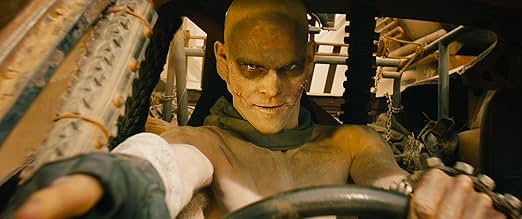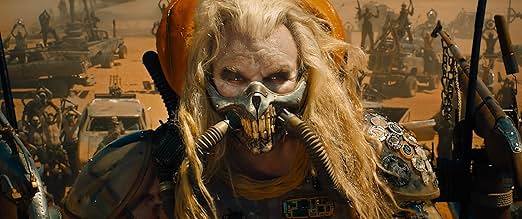In a post-apocalyptic wasteland, a woman rebels against a tyrannical ruler in search for her homeland with the aid of a group of female prisoners, a psychotic worshipper and a drifter named ... Read allIn a post-apocalyptic wasteland, a woman rebels against a tyrannical ruler in search for her homeland with the aid of a group of female prisoners, a psychotic worshipper and a drifter named Max.In a post-apocalyptic wasteland, a woman rebels against a tyrannical ruler in search for her homeland with the aid of a group of female prisoners, a psychotic worshipper and a drifter named Max.
- Won 6 Oscars
- 245 wins & 233 nominations total
Iota
- The Doof Warrior
- (as iOTA)
- Director
- Writers
- All cast & crew
- Production, box office & more at IMDbPro
Storyline
Did you know
- TriviaThe flame-shooting guitarist is Australian artist/musician Sean Hape (his father is Maori so his surname would be pronounced "hah-peh"), better known as Iota. In an interview on Vice (2013), he said the guitar weighed 132 pounds and shot real gas-powered flames, which he controlled using the whammy bar.
- GoofsThere are several scenes in which people, including The Splendid Angharad, grab onto the vertical exhaust pipes for support while crawling around on the outside of cabin of the War Rig. Truck exhausts can often reach temperatures greater than 350 degrees Fahrenheit, which would have made holding onto them with bare hands impossible.
- Crazy creditsNear the end of the credits there is a memorial dedication that reads "Lance Allen Moore II, May 24, 1987 - March 10, 2015." Apparently Moore was a Mad Max fan killed in a motorcycle accident near Silverton, New South Wales, Australia, where Mad Max 2: The Road Warrior (1981) was filmed.
- Alternate versionsA "PG-13" version was created, but only screened for American test-audiences. Positive feedback towards the "R-rated" version convinced Warner Bros to release it, theatrically.
- ConnectionsEdited into Terror Nullius (2018)
- SoundtracksElegy For Rosa
Composed by Eleni Karaindrou
© ECM Records/Verlag GMBH
Licensed courtesy of J. Albert & Son Pty Limited
Featured review
Cold-blooded, botanically medieval, crusades-like, and horrifically thrilling—that's Fury Road. As for Max, it looks like he's the same archetypal Bane, only this time, he's more immune to "I'm not afraid, I'm angry." He's silent, and angry, and frustrated. He's Rango-like, reflective of the quest to solve the water-mystery. With everything red, orange, and yellow, it seems like you're viewing 300 blended in Saw, and over-the-top F&F.
George Miller revises his ideological construct in the most exhilarating, dreadful, and striking manner this time. For all I know, the audiences spoil themselves with "cinematic orgasms," if that's a thing, throughout the movie. They're not afraid of the porcupine-trucks, maybe a little on the edge of madness, but that goes without saying. Here's a hint as to what it was like: Bane and Miranda beating the beep out of war-painted, anti-Christian, Hulu tribe—only this time, it's some dark, full-raged action with mountain bikes, and trucks, and springy tentacles moving idiotic half-Willy, half-Wonka The Da Vinci Code Bettany's horrendous versions. Miller puts his tribal culture in the crux of action, which reveals an unorthodox, authoritarian, and devout portrayal of enmity. The sport-arena action is complemented by prayers in Citadel, banging of drums, skeleton-wheels, and skeleton-feels. It has a bizarre feeling—you're dredged into the modernity of Prometheus and antediluvian era of the Exodus.
More than anything—Max's deafening seriousness, Furiosa's bald-grace, armless-attraction, sense of responsibility, and and absolute congeniality to the role (always imposingly remarkable,) religious affirmation, banging, puffing, booming, clatter, splash, tick-tick, boom—the "fantasized-realism" behind all the get-off-my-property-you-crazy-lunatic is what gives you the honesty-chills. The stunts, the effort, the don't-care-about-ourselves-just-love-the-movie-please pledge, and the extraordinarily enormous—480 hours of footage into 120 minutes of freaking-awesome warfare—blows me off of my seat in the cinema to the pale, scorching blaze of the sun, amidst the crazy-eyes of this action-genre Orange is the New Black. Even the over-editing has that medieval, darkly comical feel to it, just like 300 for example (can't think of another movie with such aberrant effects, but such positive response.)
But like any other movie, there are points where you start questioning yourself. Nothing seems to justify Max & Furiosa's relationship, mutual combats, strategies, certainty of plans, and stuff like that. But by then, the movie's not about logic or sense anymore; it's more about seeing what you wouldn't in ages. With such a brilliant ensemble—I mean it was pretty good for a solely madness-based movie—you couldn't care less about the abacus-loving dumb-toads sitting in exactly the middle seats of the theater to get the most balanced view of the screen, and judge the minus-plus of the 120 minute long clip. I feel like reporting their stupidity to the CIA—enough with the pen and paper!
Mad Max comes equitably with the characters, their roles, and the titular projections. Each name is qualified by its corresponding characteristic with the character in the movie—Spikers, Rictus Erectus et cetera. This complements the heartfelt glow to the movie itself—everything's done for the movie. They didn't feel any need to impose worldly sense into it, which is the best part, because that miniature world seemed pretty damn believable to me—but why? Maybe it were those religious beats, maybe the dragon-roars of engines, maybe it was just the psychological effect. Whatever it was, it did what it planned to.
Mad Max: Fury Road puts forth the idea that there's so much more to combats than mere combats—MMFR incorporates belligerent, spoiling-for-a-fight attitude, oppressed landscape, estranged and barbaric drug-lords, heavy-weight weaponry and wheelers, and poster-paint bombings. The intensified red-blaze of fire, the sandstorm-effect, the preposterous turn of events, the nonsensical touch of things, and the wacky script—everything wrong with the movie is everything good about the movie. Mad Max: Fury Road revises the post-apocalyptic scene—utter dryness of region and minds—and uses the irritating sense of that dryness into a rigorous will to get past it with victory—Fury Road's victory. It's not about the comparative analysis of protagonists and the white-witty-wackos, it's about what's happening throughout. And when it happens, you're only remark is: "What a lovely day."
George Miller revises his ideological construct in the most exhilarating, dreadful, and striking manner this time. For all I know, the audiences spoil themselves with "cinematic orgasms," if that's a thing, throughout the movie. They're not afraid of the porcupine-trucks, maybe a little on the edge of madness, but that goes without saying. Here's a hint as to what it was like: Bane and Miranda beating the beep out of war-painted, anti-Christian, Hulu tribe—only this time, it's some dark, full-raged action with mountain bikes, and trucks, and springy tentacles moving idiotic half-Willy, half-Wonka The Da Vinci Code Bettany's horrendous versions. Miller puts his tribal culture in the crux of action, which reveals an unorthodox, authoritarian, and devout portrayal of enmity. The sport-arena action is complemented by prayers in Citadel, banging of drums, skeleton-wheels, and skeleton-feels. It has a bizarre feeling—you're dredged into the modernity of Prometheus and antediluvian era of the Exodus.
More than anything—Max's deafening seriousness, Furiosa's bald-grace, armless-attraction, sense of responsibility, and and absolute congeniality to the role (always imposingly remarkable,) religious affirmation, banging, puffing, booming, clatter, splash, tick-tick, boom—the "fantasized-realism" behind all the get-off-my-property-you-crazy-lunatic is what gives you the honesty-chills. The stunts, the effort, the don't-care-about-ourselves-just-love-the-movie-please pledge, and the extraordinarily enormous—480 hours of footage into 120 minutes of freaking-awesome warfare—blows me off of my seat in the cinema to the pale, scorching blaze of the sun, amidst the crazy-eyes of this action-genre Orange is the New Black. Even the over-editing has that medieval, darkly comical feel to it, just like 300 for example (can't think of another movie with such aberrant effects, but such positive response.)
But like any other movie, there are points where you start questioning yourself. Nothing seems to justify Max & Furiosa's relationship, mutual combats, strategies, certainty of plans, and stuff like that. But by then, the movie's not about logic or sense anymore; it's more about seeing what you wouldn't in ages. With such a brilliant ensemble—I mean it was pretty good for a solely madness-based movie—you couldn't care less about the abacus-loving dumb-toads sitting in exactly the middle seats of the theater to get the most balanced view of the screen, and judge the minus-plus of the 120 minute long clip. I feel like reporting their stupidity to the CIA—enough with the pen and paper!
Mad Max comes equitably with the characters, their roles, and the titular projections. Each name is qualified by its corresponding characteristic with the character in the movie—Spikers, Rictus Erectus et cetera. This complements the heartfelt glow to the movie itself—everything's done for the movie. They didn't feel any need to impose worldly sense into it, which is the best part, because that miniature world seemed pretty damn believable to me—but why? Maybe it were those religious beats, maybe the dragon-roars of engines, maybe it was just the psychological effect. Whatever it was, it did what it planned to.
Mad Max: Fury Road puts forth the idea that there's so much more to combats than mere combats—MMFR incorporates belligerent, spoiling-for-a-fight attitude, oppressed landscape, estranged and barbaric drug-lords, heavy-weight weaponry and wheelers, and poster-paint bombings. The intensified red-blaze of fire, the sandstorm-effect, the preposterous turn of events, the nonsensical touch of things, and the wacky script—everything wrong with the movie is everything good about the movie. Mad Max: Fury Road revises the post-apocalyptic scene—utter dryness of region and minds—and uses the irritating sense of that dryness into a rigorous will to get past it with victory—Fury Road's victory. It's not about the comparative analysis of protagonists and the white-witty-wackos, it's about what's happening throughout. And when it happens, you're only remark is: "What a lovely day."
- hamass-mujadid
- May 11, 2015
- Permalink
Women in Science Fiction
Women in Science Fiction
Whether they are exploring the stars, escaping dystopias, or making the world a better place, these women are what science fiction is all about.
Details
- Release date
- Countries of origin
- Official sites
- Languages
- Also known as
- Mad Max: Furia en el camino
- Filming locations
- Production companies
- See more company credits at IMDbPro
Box office
- Budget
- $150,000,000 (estimated)
- Gross US & Canada
- $154,280,290
- Opening weekend US & Canada
- $45,428,128
- May 17, 2015
- Gross worldwide
- $380,437,267
- Runtime2 hours
- Color
- Sound mix
- Aspect ratio
- 2.39 : 1
Contribute to this page
Suggest an edit or add missing content















































